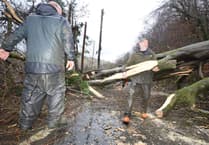I was sad to read the comments regarding the use of the Welsh language, how some people feel that the language is pushed on them. I started learning Welsh 25 years ago as soon as we’d made the decision to move here. In all that time I’ve never felt that the language was pushed on me. I couldn’t teach in Welsh speaking schools and thought that was fair enough so became a private tutor and learned enough Welsh to teach maths through the medium of yr iaith hardd.
I wish I was fluent in Welsh. I can read and write a reasonable amount but, as soon as my lovely neighbours start a conversation, my brain is trying to separate the words and I’m lost. I’ve never been immersed enough in the language, unlike in English. When I moved to England nobody expected me to be understood in my native Dutch tongue, least of all myself.
The British Council reports that “over 50 per cent of the world’s population function in two or more languages on a daily basis. Multilinguism is the norm.” When I was at school in the Netherlands I had to learn English, French, German and Latin. That was at the age of 12. My French, German and Latin are sketchy at best. It’s quite different now over there. The Netherlands has become a bi-lingual country, Dutch and English. Children learn English from a very young age; many indeed attend English only schools. It hasn’t had a detrimental effect upon the Dutch language, far from it, Dutch is still the common language spoken in the home and in public. A friend of mine lives in Italy. Her children speak four languages in their school, Italian, German, English and Ladin.
Wales is officially a bilingual country but Welsh is not the dominant language. I’ve attended lots of functions that start with introductions in Welsh but, before long, the conversation around tables is conducted in English only. To become truly bilingual, the uptake of Welsh has to increase. Children learn in such a wonderful fashion. They don’t give a hoot about grammar. We all understand a child when they say ‘sitted’; they soon use the correct word. My Welsh speaking students in their maths lessons ignored all the rules of Welsh and would merrily say and write dau-mil whereas in my Welsh lessons I was taught to use dwy-fil.
Mutations! It’s the first word you’re confronted with when you attend Welsh classes. I’ve been to some and the teachers were obsessing with mutations. It’s enough to put a lot of adults off. Children learn through repetition, pointing, singing, chanting nursery rhymes, playing games, everything that should happen in the first few years of their lives. Parents shouldn’t panic, kids cope. If your child comes home with something you don’t understand, ask the school to organise lessons for the adults, who should learn in the same way as the children. Better, more fun classes for adults are needed. I’d be tempted to go back to polish up my own Welsh.
After the Second World War there was a referendum in the Netherlands, asking the population if they wanted English as their official language. It was roundly rejected. Its status as a bilingual nation has happened organically and is not official. Older people tend to only speak Dutch but the younger generations merrily switch from one to the other. Minority languages should be protected but also championed. People who move to Wales should feel proud to live here and use Welsh, even only for diolch and bore da. Please don’t moan, get behind the language. Nadolig Llawen i bawb.




